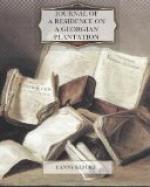expression. He was, however, jet black, and certainly
did not owe these personal advantages to any mixture
in his blood. There is a certain African tribe
from which the West Indian slave market is chiefly
recruited, who have these same characteristic features,
and do not at all present the ignoble and ugly negro
type, so much more commonly seen here. They are
a tall, powerful people, with remarkably fine figures,
regular features, and a singularly warlike and fierce
disposition, in which respect they also differ from
the race of negroes existing on the American plantations.
I do not think Morris, however, could have belonged
to this tribe, though perhaps Othello did, which would
at once settle the difficulties of those commentators
who, abiding by Iago’s very disagreeable suggestions
as to his purely African appearance, are painfully
compelled to forego the mitigation of supposing him
a Moor and not a negro. Did I ever tell you of
my dining in Boston, at the H——’s,
on my first visit to that city, and sitting by Mr.
John Quincy Adams, who, talking to me about Desdemona,
assured me, with a most serious expression of sincere
disgust, that he considered all her misfortunes as
a very just judgement upon her for having married
a ‘nigger?’ I think if some ingenious American
actor of the present day, bent upon realising Shakespeare’s
finest conceptions, with all the advantages of modern
enlightenment, could contrive to slip in that opprobrious
title, with a true South-Carolinian anti-Abolitionist
expression, it might really be made quite a point for
Iago, as, for instance, in his first soliloquy—’I
hate the nigger,’ given in proper Charleston
or Savannah fashion, I am sure would tell far better
than ’I hate the Moor.’ Only think,
E——, what a very new order of interest
the whole tragedy might receive, acted throughout
from this standpoint, as the Germans call it in this
country, and called ’Amalgamation, or the Black
Bridal.’
On their return from their walk this afternoon, the
children brought home some pieces of sugar-cane, of
which a small quantity grows on the island. When
I am most inclined to deplore the condition of the
poor slaves on these cotton and rice plantations,
the far more intolerable existence and harder labour
of those employed on the sugar estates occurs to me,
sometimes producing the effect of a lower circle in
Dante’s ’Hell of Horrors,’ opening
beneath the one where he seems to have reached the
climax of infernal punishment. You may have seen
this vegetable, and must, at any rate, I should think,
be familiar with it by description. It is a long
green reed, like the stalk of the maize, or Indian
corn, only it shoots up to a much more considerable
height, and has a consistent pith, which, together
with the rind itself, is extremely sweet. The
principal peculiarity of this growth, as perhaps you
know, is that they are laid horizontally in the earth
when they are planted for propagation, and from each
of the notches or joints of the recumbent cane a young
shoot is produced at the germinating season.




